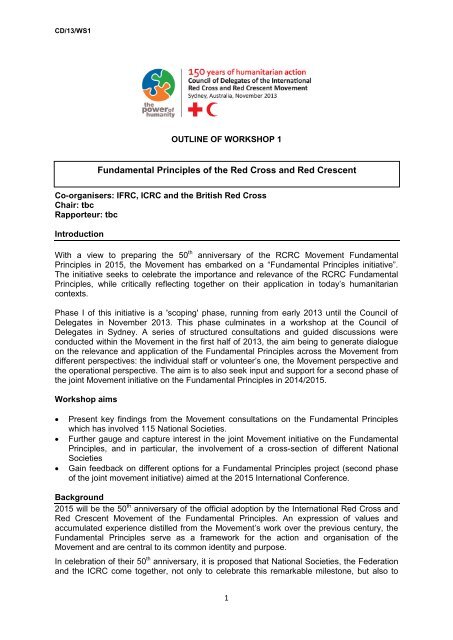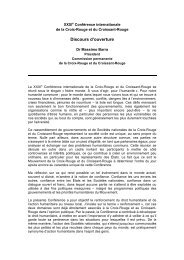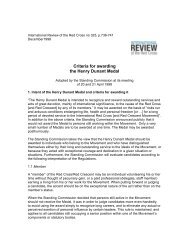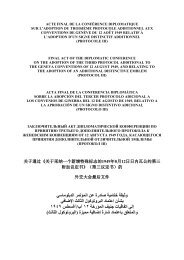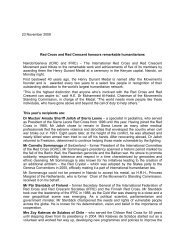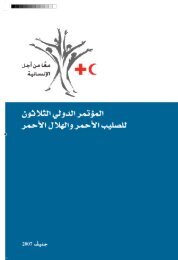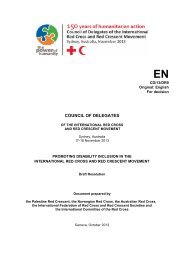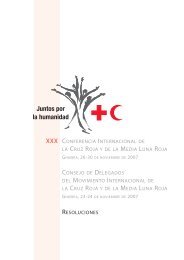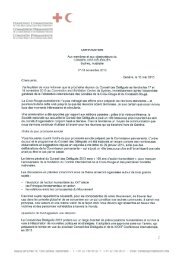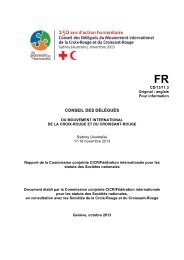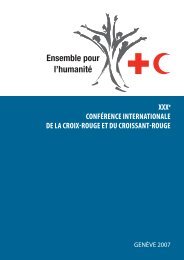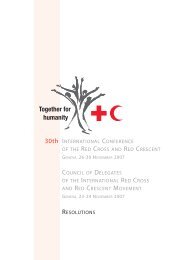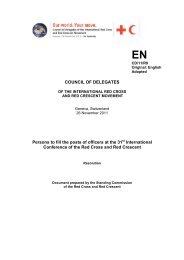CD13 WS1 â Workshop 1 - Standing Commission of the Red Cross ...
CD13 WS1 â Workshop 1 - Standing Commission of the Red Cross ...
CD13 WS1 â Workshop 1 - Standing Commission of the Red Cross ...
Create successful ePaper yourself
Turn your PDF publications into a flip-book with our unique Google optimized e-Paper software.
CD/13/<strong>WS1</strong><br />
OUTLINE OF WORKSHOP 1<br />
Fundamental Principles <strong>of</strong> <strong>the</strong> <strong>Red</strong> <strong>Cross</strong> and <strong>Red</strong> Crescent<br />
Co-organisers: IFRC, ICRC and <strong>the</strong> British <strong>Red</strong> <strong>Cross</strong><br />
Chair: tbc<br />
Rapporteur: tbc<br />
Introduction<br />
With a view to preparing <strong>the</strong> 50 th anniversary <strong>of</strong> <strong>the</strong> RCRC Movement Fundamental<br />
Principles in 2015, <strong>the</strong> Movement has embarked on a “Fundamental Principles initiative”.<br />
The initiative seeks to celebrate <strong>the</strong> importance and relevance <strong>of</strong> <strong>the</strong> RCRC Fundamental<br />
Principles, while critically reflecting toge<strong>the</strong>r on <strong>the</strong>ir application in today’s humanitarian<br />
contexts.<br />
Phase I <strong>of</strong> this initiative is a 'scoping' phase, running from early 2013 until <strong>the</strong> Council <strong>of</strong><br />
Delegates in November 2013. This phase culminates in a workshop at <strong>the</strong> Council <strong>of</strong><br />
Delegates in Sydney. A series <strong>of</strong> structured consultations and guided discussions were<br />
conducted within <strong>the</strong> Movement in <strong>the</strong> first half <strong>of</strong> 2013, <strong>the</strong> aim being to generate dialogue<br />
on <strong>the</strong> relevance and application <strong>of</strong> <strong>the</strong> Fundamental Principles across <strong>the</strong> Movement from<br />
different perspectives: <strong>the</strong> individual staff or volunteer’s one, <strong>the</strong> Movement perspective and<br />
<strong>the</strong> operational perspective. The aim is to also seek input and support for a second phase <strong>of</strong><br />
<strong>the</strong> joint Movement initiative on <strong>the</strong> Fundamental Principles in 2014/2015.<br />
<strong>Workshop</strong> aims<br />
• Present key findings from <strong>the</strong> Movement consultations on <strong>the</strong> Fundamental Principles<br />
which has involved 115 National Societies.<br />
• Fur<strong>the</strong>r gauge and capture interest in <strong>the</strong> joint Movement initiative on <strong>the</strong> Fundamental<br />
Principles, and in particular, <strong>the</strong> involvement <strong>of</strong> a cross-section <strong>of</strong> different National<br />
Societies<br />
• Gain feedback on different options for a Fundamental Principles project (second phase<br />
<strong>of</strong> <strong>the</strong> joint movement initiative) aimed at <strong>the</strong> 2015 International Conference.<br />
Background<br />
2015 will be <strong>the</strong> 50 th anniversary <strong>of</strong> <strong>the</strong> <strong>of</strong>ficial adoption by <strong>the</strong> International <strong>Red</strong> <strong>Cross</strong> and<br />
<strong>Red</strong> Crescent Movement <strong>of</strong> <strong>the</strong> Fundamental Principles. An expression <strong>of</strong> values and<br />
accumulated experience distilled from <strong>the</strong> Movement’s work over <strong>the</strong> previous century, <strong>the</strong><br />
Fundamental Principles serve as a framework for <strong>the</strong> action and organisation <strong>of</strong> <strong>the</strong><br />
Movement and are central to its common identity and purpose.<br />
In celebration <strong>of</strong> <strong>the</strong>ir 50 th anniversary, it is proposed that National Societies, <strong>the</strong> Federation<br />
and <strong>the</strong> ICRC come toge<strong>the</strong>r, not only to celebrate this remarkable milestone, but also to<br />
1
CD/13/<strong>WS1</strong><br />
share experiences and to learn from one ano<strong>the</strong>r as well as to reassert <strong>the</strong> contemporary<br />
relevance and importance <strong>of</strong> <strong>the</strong> Fundamental Principles. Celebration should be supported<br />
by an evidence-base, and to this end, a working group consisting <strong>of</strong> <strong>the</strong> ICRC, <strong>the</strong><br />
International Federation and <strong>the</strong> British <strong>Red</strong> <strong>Cross</strong> conducted a scoping exercise in <strong>the</strong><br />
period <strong>of</strong> February to July 2013, to collect <strong>the</strong> views from individuals in <strong>the</strong> Movement on <strong>the</strong><br />
contemporary relevance <strong>of</strong> <strong>the</strong> Fundamental Principles. Based on <strong>the</strong> findings <strong>of</strong> this joint<br />
work, <strong>the</strong>re is no doubt that both <strong>Red</strong> <strong>Cross</strong> <strong>Red</strong> Crescent volunteers and staff, as well as<br />
<strong>the</strong>ir organisations, consider <strong>the</strong> Fundamental Principles to be <strong>of</strong> great relevance and as a<br />
vital element <strong>of</strong> our collective identity and action.<br />
This paper is in support <strong>of</strong> a <strong>Workshop</strong> taking place at <strong>the</strong> Council <strong>of</strong> Delegates in Sydney in<br />
November 2013. The objectives <strong>of</strong> this <strong>Workshop</strong> are to share feedback from <strong>the</strong><br />
consultations that have taken place over <strong>the</strong> last few months and to propose a new<br />
Movement initiative that builds on <strong>the</strong> findings to date and contributes to principled <strong>Red</strong><br />
<strong>Cross</strong> <strong>Red</strong> Crescent action and to <strong>the</strong> celebration <strong>of</strong> <strong>the</strong> 50th anniversary <strong>of</strong> <strong>the</strong><br />
Fundamental Principles, including that which will take place at <strong>the</strong> Statutory Meetings in<br />
2015. The discussion generated at <strong>the</strong> workshop will be captured in <strong>the</strong> workshop’s<br />
conclusion.<br />
Presented hereafter is a snapshot <strong>of</strong> findings from consultations and conversations held<br />
between February and July 2013 with <strong>Red</strong> <strong>Cross</strong> and <strong>Red</strong> Crescent volunteers and staff<br />
from 115 National Societies. This snapshot is a compilation <strong>of</strong> thoughts and impressions on<br />
<strong>the</strong> importance, relevance and impact <strong>of</strong> <strong>the</strong> Fundamental Principles, ranging from an<br />
organisational and operational perspective to <strong>the</strong> individual perspective <strong>of</strong> staff and<br />
volunteers.<br />
The purpose <strong>of</strong> this scoping phase was to generate dialogue across <strong>the</strong> Movement about<br />
both <strong>the</strong> challenges and <strong>the</strong> opportunities that <strong>the</strong> Fundamental Principles bring for our<br />
identity and action. Importantly, it also sought to generate support from all Movement<br />
components and momentum for a joint Movement initiative that will run from <strong>the</strong> Council <strong>of</strong><br />
Delegates until <strong>the</strong> 2015 International Conference and <strong>the</strong> 50 th anniversary <strong>of</strong> <strong>the</strong> adoption <strong>of</strong><br />
<strong>the</strong> Fundamental Principles.<br />
The broad consultation process conducted during this period addressed four main issues:<br />
<strong>the</strong> relevance <strong>of</strong> <strong>the</strong> Principles to <strong>Red</strong> <strong>Cross</strong> and <strong>Red</strong> Crescent volunteers and staff; <strong>the</strong> role<br />
<strong>of</strong> <strong>the</strong> Principles in our collective identity and positioning; <strong>the</strong>ir operational significance; and<br />
views on <strong>the</strong> future direction <strong>of</strong> a project on <strong>the</strong> Fundamental Principles.<br />
Key findings <strong>of</strong> 2013 consultations (scoping phase)<br />
Regional distribution <strong>of</strong> individuals consulted:<br />
2
CD/13/<strong>WS1</strong><br />
Zone<br />
Number <strong>of</strong> National Societies consulted<br />
Africa 31<br />
Americas 14<br />
Asia Pacific 22<br />
Europe and Central Asia 33<br />
Middle East and North Africa 15<br />
TOTAL 115 1<br />
This significant and geographically representative sample was supplemented by o<strong>the</strong>r<br />
consultations with Disaster Management delegates 2 and o<strong>the</strong>r studies that were undertaken<br />
in parallel, which have looked at <strong>the</strong> application <strong>of</strong> <strong>the</strong> Fundamental Principles in specific<br />
contexts 3 . These strands <strong>of</strong> consultation provided a rich variety <strong>of</strong> views, based on lived<br />
experience, which was fur<strong>the</strong>r complemented by <strong>the</strong> engagement <strong>of</strong> many individuals<br />
through a Facebook group set up to encourage discussion on <strong>the</strong> Fundamental Principles.<br />
The headline conclusions that can be drawn from this process and which form <strong>the</strong><br />
background to <strong>the</strong> project proposal outlined in <strong>the</strong> second half <strong>of</strong> this paper are:<br />
• The Fundamental Principles remain universally relevant and important across <strong>the</strong><br />
Movement, at individual, institutional and operational levels, and are seen as an<br />
integrated package where all 7 fundamental Principles are inter-related and<br />
important.<br />
• It is important that <strong>the</strong> understanding and application <strong>of</strong> <strong>the</strong> Principles be better<br />
contextualised so that <strong>the</strong> most benefit can be drawn from <strong>the</strong>ir use. National<br />
Societies have expressed a need for practical and operational guidance on <strong>the</strong><br />
application <strong>of</strong> Fundamental Principles in today's humanitarian contexts.<br />
• There is seen to be uneven understanding and application <strong>of</strong> <strong>the</strong> Fundamental<br />
Principles across <strong>the</strong> Movement. Given this challenge, <strong>the</strong> key role <strong>of</strong> <strong>the</strong><br />
leadership in <strong>the</strong> Movement as guardians and promoters <strong>of</strong> <strong>the</strong> Fundamental<br />
Principles was emphasised by many throughout <strong>the</strong> consultation process.<br />
In terms <strong>of</strong> <strong>the</strong> specific areas <strong>of</strong> focus, <strong>the</strong> feedback was notably consistent across all<br />
components and levels <strong>of</strong> <strong>the</strong> Movement:<br />
Individual perspectives: <strong>the</strong> relevance <strong>of</strong> <strong>the</strong> Principles to volunteers and staff:<br />
As well as forming <strong>the</strong> basis <strong>of</strong> <strong>the</strong> organisational culture <strong>of</strong> <strong>the</strong> organisations that<br />
make up <strong>the</strong> Movement, <strong>the</strong> Fundamental Principles provide a strong basis for<br />
individuals’ commitment, decisions, values and behaviour:<br />
• National Society volunteers identify <strong>the</strong> FPs strongly with <strong>the</strong>ir own personal values, <strong>the</strong><br />
Fundamental Principles is <strong>of</strong>ten what attracts volunteers to work for <strong>Red</strong> <strong>Cross</strong> and <strong>Red</strong><br />
Crescent<br />
• The Movement being based on Fundamental Principles is a source <strong>of</strong> pride and<br />
motivation for volunteers in particular<br />
• Translating <strong>the</strong> Fundamental Principles into individual behaviour as <strong>Red</strong> <strong>Cross</strong> and <strong>Red</strong><br />
Crescent volunteer or staff contributes to organisational adherence and operational<br />
impact<br />
The role <strong>of</strong> <strong>the</strong> Fundamental Principles in our collective identity and positioning:<br />
1 In fact, 179 consultations took place as some National Societies had more than one opportunity to provide input.<br />
2 115 people responded around a third <strong>of</strong> whom work in global disaster response, ano<strong>the</strong>r third work mainly in <strong>the</strong> Asia Pacific<br />
region and <strong>the</strong> final third is quite evenly spread across <strong>the</strong> o<strong>the</strong>r regions, Africa, Americas, MENA and Europe.<br />
3 Principles in Action studies on <strong>the</strong> Lebanon and Somalia, British <strong>Red</strong> <strong>Cross</strong> 2012 and 2013 respectively<br />
3
CD/13/<strong>WS1</strong><br />
The Fundamental Principles are a distinguishing feature <strong>of</strong> <strong>the</strong> Movement in <strong>the</strong><br />
broader humanitarian landscape and, in spite <strong>of</strong> inherent challenges, are a force for<br />
unity within <strong>the</strong> Movement:<br />
• The Fundamental Principles and <strong>the</strong>ir consistent application are strongly related to <strong>the</strong><br />
<strong>Red</strong> <strong>Cross</strong> and <strong>Red</strong> Crescent brand and reputation;<br />
• The distinctiveness <strong>of</strong> <strong>the</strong> Movement is not assured: <strong>the</strong>re is a sense that through <strong>the</strong><br />
adoption <strong>of</strong> some <strong>of</strong> <strong>the</strong> Fundamental Principles by o<strong>the</strong>r actors, <strong>the</strong>y alone no longer<br />
constitute <strong>the</strong> distinctive identity <strong>of</strong> Movement actors. However, certain characteristics <strong>of</strong><br />
<strong>the</strong> <strong>Red</strong> <strong>Cross</strong> and <strong>Red</strong> Crescent Movement – linked to <strong>the</strong> application <strong>of</strong> <strong>the</strong><br />
Fundamental Principles – were considered a distinctive feature e.g. close ties <strong>of</strong> National<br />
Societies to local communities through <strong>the</strong> principle <strong>of</strong> Voluntary Service;<br />
• The principle <strong>of</strong> Unity is <strong>of</strong>ten seen to be challenged: on a national level, by increasingly<br />
independent branches; by National Societies working in ano<strong>the</strong>r country in unilateral<br />
action without <strong>the</strong> consent <strong>of</strong> <strong>the</strong> host National Society ; and by a lack <strong>of</strong> unity between<br />
ICRC and <strong>the</strong> International Federation;<br />
• There is a general sense that <strong>the</strong>re is too much discretion in <strong>the</strong> application <strong>of</strong> <strong>the</strong><br />
Fundamental Principles and insufficient compliance/accountability measures in place to<br />
curb this.<br />
The operational significance <strong>of</strong> <strong>the</strong> Fundamental Principles:<br />
The Fundamental Principles are operationally relevant whe<strong>the</strong>r in strategic planning,<br />
decision-making or in direct contact with beneficiaries. All seven principles were<br />
mentioned in relation to access, acceptance, quality and impact:<br />
• A lack <strong>of</strong> staff and volunteer diversity (at all levels) is an impediment to <strong>the</strong> application<br />
and perception <strong>of</strong> certain Fundamental Principles, especially impartiality and neutrality;<br />
• There was on-going and significant confusion expressed over <strong>the</strong> auxiliary role and its<br />
relation with independence;<br />
• More guidance would be welcomed on how best to balance principles against one<br />
ano<strong>the</strong>r, especially humanity and <strong>the</strong> extent to which it can override <strong>the</strong> application <strong>of</strong><br />
o<strong>the</strong>r Fundamental Principles;<br />
• There were issues noted around <strong>the</strong> political affiliation <strong>of</strong> staff and volunteers –<br />
especially at governance level – and <strong>the</strong> implications this can have for independence<br />
and neutrality (both real and perceived);<br />
• There is a need to ensure that efforts are made to constantly and consistently<br />
disseminate and communicate <strong>the</strong> Fundamental Principles.<br />
It should be emphasised that, as well as <strong>the</strong> challenges that were highlighted, <strong>the</strong>re is<br />
also a wealth <strong>of</strong> excellent reflection and action based on <strong>the</strong> Fundamental Principles<br />
that underpins <strong>the</strong> daily activities <strong>of</strong> <strong>Red</strong> <strong>Cross</strong> and <strong>Red</strong> Crescent actors and that this<br />
was also evidenced in <strong>the</strong> consultations.<br />
Going forward: Proposal for <strong>the</strong> Movement-wide initiative on <strong>the</strong> Fundamental<br />
Principles (2014-2015)<br />
Building on this process, and on <strong>the</strong> input expected at <strong>the</strong> Council <strong>of</strong> Delegates, it is<br />
proposed that <strong>the</strong>re be a joint Movement initiative on <strong>the</strong> Fundamental Principles between<br />
now and <strong>the</strong> 2015 International Conference. Drawing on <strong>the</strong> very clear messages given<br />
through <strong>the</strong> consultation, <strong>the</strong> proposed initiative will focus on 3 main elements over an 18-<br />
month period:<br />
4
CD/13/<strong>WS1</strong><br />
1. A series <strong>of</strong> consultative workshops will be undertaken with key decision-makers (senior<br />
management and governance and operational decision-makers), in order to identify reallife<br />
dilemmas which are <strong>of</strong> particular relevance to specific contexts (including contexts<br />
which are peaceful and less disaster-prone). Through <strong>the</strong>se events, participants will<br />
explore <strong>the</strong> application <strong>of</strong> <strong>the</strong> Fundamental Principles to identify and contribute to<br />
capturing constructive approaches to addressing identified dilemmas. The workshops<br />
will also serve as an opportunity for leaders to reflect on what changes <strong>the</strong>y can make in<br />
<strong>the</strong>ir own organisations to more effectively utilise <strong>the</strong> Fundamental Principles in <strong>the</strong>ir<br />
broader practice.<br />
2. Based on this, <strong>the</strong> project team will elaborate guidance and easily accessible learning<br />
materials which will facilitate <strong>the</strong> contextualised application <strong>of</strong> <strong>the</strong> Fundamental<br />
Principles.<br />
3. Running parallel to this, <strong>the</strong>re will be an on-going effort across <strong>the</strong> Movement to identify<br />
where and how <strong>the</strong> Fundamental Principles can be more explicitly integrated into <strong>the</strong><br />
various training and capacity building processes, tools and activities which can improve<br />
our collective understanding and application <strong>of</strong> <strong>the</strong> Fundamental Principles. Specific<br />
‘inserts’, drawing on <strong>the</strong> guidance and materials produced from <strong>the</strong> workshops will <strong>the</strong>n<br />
be introduced over time.<br />
While understanding that <strong>the</strong>re is a need to have a specific and dedicated effort to<br />
reinvigorate <strong>the</strong> Fundamental Principles within <strong>the</strong> Movement, <strong>the</strong> aim <strong>of</strong> <strong>the</strong> proposed<br />
initiative is not to have a ‘stand-alone’ project which results in a Fundamental Principles<br />
approach, or manual. The aim is ra<strong>the</strong>r to acknowledge <strong>the</strong> scope <strong>of</strong> <strong>the</strong> challenge and to<br />
seek out opportunities to mainstream <strong>the</strong> learning about and practical application <strong>of</strong><br />
Fundamental Principles where this can have real effect, notably through close engagement<br />
with existing initiatives.<br />
The proposed initiative would be jointly owned and managed by <strong>the</strong> ICRC and <strong>the</strong><br />
International Federation, with strong engagement from senior leadership not only from <strong>the</strong><br />
two Geneva-based institutions (and through <strong>the</strong>m from <strong>the</strong>ir respective <strong>of</strong>fices and<br />
delegations), but also through a Steering Committee consisting <strong>of</strong> a small number <strong>of</strong><br />
National Societies, which can provide <strong>the</strong>ir own specific perspectives and commitment. The<br />
initiative will also seek <strong>the</strong> active contribution <strong>of</strong> those already engaged in specific work on<br />
<strong>the</strong> Fundamental Principles within <strong>the</strong> Movement.<br />
2013 Council <strong>of</strong> Delegates workshop on <strong>the</strong> Fundamental Principles<br />
The Fundamental Principles are a force that binds toge<strong>the</strong>r <strong>the</strong> components <strong>of</strong> <strong>the</strong><br />
International <strong>Red</strong> <strong>Cross</strong> and <strong>Red</strong> Crescent Movement. They are an expression <strong>of</strong> our shared<br />
values and are a motivating factor as we work in <strong>the</strong> service <strong>of</strong> humanity. Not only do <strong>the</strong>y<br />
shape our mission and our identity, but <strong>the</strong>y also provide practical guidance for our action. It<br />
is a remarkable achievement that, across <strong>the</strong> different countries, cultures and peoples<br />
represented in <strong>the</strong> Movement; we have found and articulated common principles. The<br />
coming two years present a perfect opportunity to celebrate this achievement and to work<br />
toge<strong>the</strong>r to explore and fur<strong>the</strong>r embrace this set <strong>of</strong> principles.<br />
It is hoped that this Council <strong>of</strong> Delegates workshop will serve as a launch pad for a<br />
meaningful process <strong>of</strong> reflection and learning within <strong>the</strong> Movement that will streng<strong>the</strong>n <strong>the</strong><br />
bond between us as components <strong>of</strong> <strong>the</strong> Movement, enhance our work, and in doing so<br />
ultimately benefit those we seek to help.<br />
<strong>Workshop</strong> format (120 minutes)<br />
5
CD/13/<strong>WS1</strong><br />
• Chair’s Introduction<br />
• Presentation <strong>of</strong> consultation process and findings<br />
• Panellists sharing <strong>of</strong> concrete Fundamental Principles dilemma’s reflecting main issues<br />
identified through consultations<br />
• Plenary discussion, Q&A<br />
• Proposal for <strong>the</strong> Movement-wide Fundamental Principles initiative 2014-2015<br />
o Chair presents proposal<br />
o Feedback and input from <strong>the</strong> floor<br />
• Chair wrap up and conclusions<br />
In order to generate interest and to showcase feedback from across <strong>the</strong> world, <strong>the</strong> workshop<br />
room will be decorated with quotes, images and feedback on <strong>the</strong> Fundamental Principles<br />
generated through a social media (facebook) campaign. It is hoped that <strong>the</strong> workshop will<br />
also include multimedia contributions from those unable to be present in person at <strong>the</strong><br />
workshop.<br />
The aim will be to generate a panel that is lively, engaging and diverse. The context will be<br />
set through providing some <strong>of</strong> <strong>the</strong> key findings from <strong>the</strong> consultations. This will, however, be<br />
limited to headlines and conclusions only so as to allow time for 2-3 short interventions from<br />
different Movement actors illustrating <strong>the</strong> relevance and application <strong>of</strong> <strong>the</strong> Fundamental<br />
Principles in different contexts.<br />
A way forward will <strong>the</strong>n be proposed and <strong>the</strong> floor will be opened up to workshop participants<br />
requested to give <strong>the</strong>ir feedback and share thoughts.<br />
6


